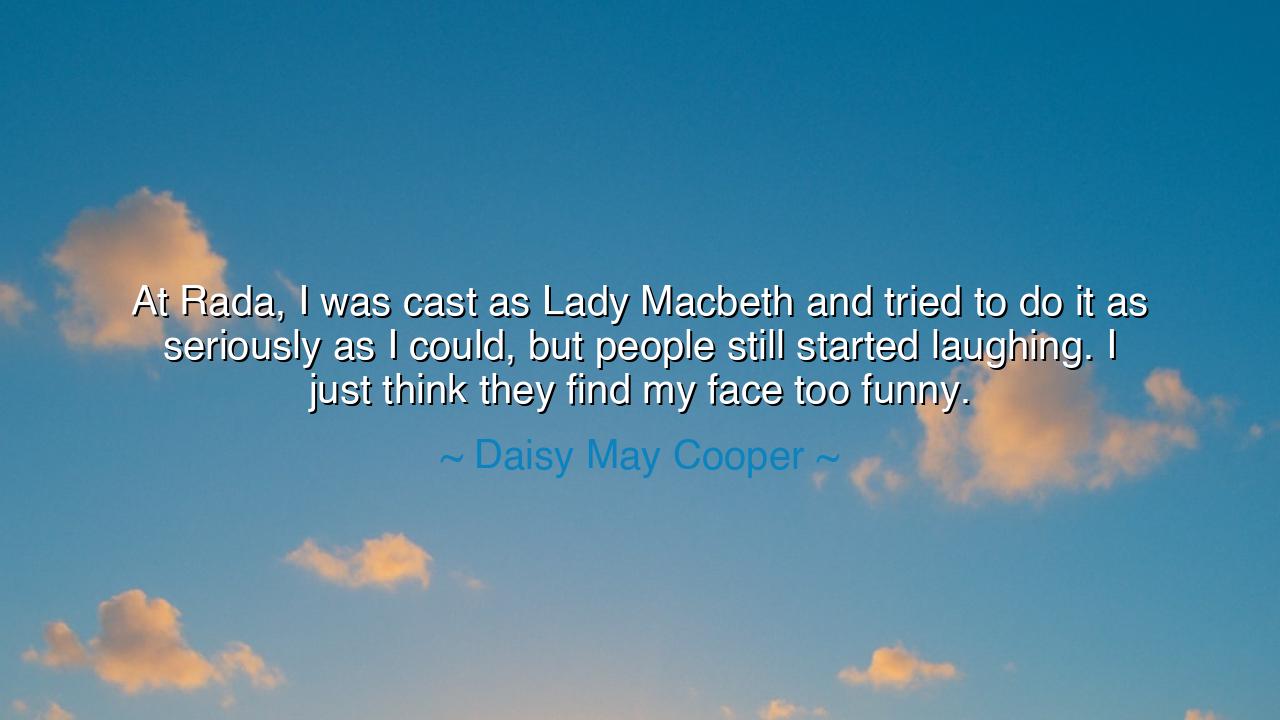
At Rada, I was cast as Lady Macbeth and tried to do it as
At Rada, I was cast as Lady Macbeth and tried to do it as seriously as I could, but people still started laughing. I just think they find my face too funny.






When Daisy May Cooper said, “At RADA, I was cast as Lady Macbeth and tried to do it as seriously as I could, but people still started laughing. I just think they find my face too funny,” she spoke not with bitterness, but with the self-awareness of one who has glimpsed the strange alchemy between destiny and identity. Beneath the humor of her words lies a profound truth about the tension between intention and perception, between how we see ourselves and how the world chooses to see us. Her reflection is not only the story of a young actor at the Royal Academy of Dramatic Art, but the story of every soul who has tried to be one thing and found themselves fated to be another.
The origin of this quote comes from Cooper’s early struggles as a performer. Known now for her razor-sharp wit and brilliantly awkward comedy in This Country, she once aspired to the gravitas of tragedy — to stride the stage as Lady Macbeth, that queen of ambition and torment. But when she took on the role, intending solemnity, the audience laughed. Not because she failed, but because her natural essence — her comic spirit, her face alive with humor — refused to be hidden beneath the mask of tragedy. What she discovered in that moment was a form of revelation: that destiny often speaks through the world’s reaction to us, even when it contradicts our plans.
This paradox — that what we are meant to be sometimes reveals itself in our failed attempts to be something else — is as old as the human story. The ancients would have called it moira, the divine thread of fate that no mortal can escape. Just as Achilles, born for battle, could not live in peace, or Demosthenes, mocked for his stammer, became the greatest orator of Athens by mastering the very thing that once humiliated him, so too did Daisy’s laughter-born failure reveal her true calling. The audience’s laughter, though unintended, was not mockery — it was prophecy. It was as if the universe itself whispered: “You were not made to brood among ghosts, but to make the living laugh.”
There is, however, a quiet tragedy in her words. She says, “I tried to do it as seriously as I could,” with the earnest heart of a young artist who wishes to be taken seriously. This is a universal longing — the desire to prove depth where others see levity, to show strength where others see softness. Many souls wrestle with this — the warrior who is called gentle, the scholar who is dismissed as a dreamer, the comedian who yearns to be understood beyond the laugh. But the wise learn that acceptance of one’s true gift is not surrender; it is liberation. For the one who stops fighting their nature becomes unstoppable.
Consider the story of Charlie Chaplin, who once sought to be a dramatic actor. Yet every time he walked, the audience laughed. His body, his gait, his expressions — all were poetry in motion, but to the world they spoke of comedy. Chaplin, like Daisy, could have resented it. Instead, he embraced it. He transformed his “funny face” into a vessel of truth, turning laughter into empathy and folly into art. Through that laughter, he made the world weep and reflect. What Daisy experienced at RADA is the same eternal pattern: the face that makes people laugh is not cursed — it is chosen. For laughter, too, is sacred. It softens the heart and reveals the humanity that tragedy often hides.
In this way, Cooper’s reflection becomes more than an anecdote — it becomes a meditation on destiny and self-knowledge. We are not always born to walk the paths we desire. Some are meant to move the soul with sorrow; others are meant to awaken it with joy. To fight what the universe has planted in you is to labor in vain. Yet to accept it — to find purpose in how others respond to your presence — is to transform confusion into calling. The funny face, the clumsy word, the awkwardness others notice before you do — these may be the very signs of your greatness, if only you have the courage to see them not as flaws, but as instruments of truth.
So, my children, take this lesson to heart: what the world reflects back to you is often your mirror of purpose. Do not curse the laughter that greets your solemnity, nor the silence that meets your song. The world’s reaction is not your enemy — it is your teacher. If they laugh when you mean to be serious, perhaps you were born to heal through laughter. If they cry when you mean to inspire, perhaps you were born to teach through tenderness. Life’s response to your effort is the compass of your becoming.
Thus, as Daisy May Cooper discovered, one’s greatest gift often hides behind the mask of one’s greatest frustration. When she stood upon the stage as Lady Macbeth, she sought tragedy and found comedy — but in that irony, she found herself. The lesson, eternal and simple, is this: embrace who you are, for even when the world misunderstands you, it may still be recognizing your light. And whether they laugh or weep, let it not trouble you — for both laughter and tears, when born of truth, are proof that you have touched the human heart.






AAdministratorAdministrator
Welcome, honored guests. Please leave a comment, we will respond soon